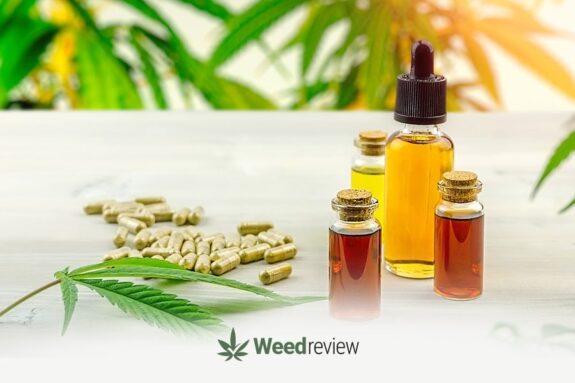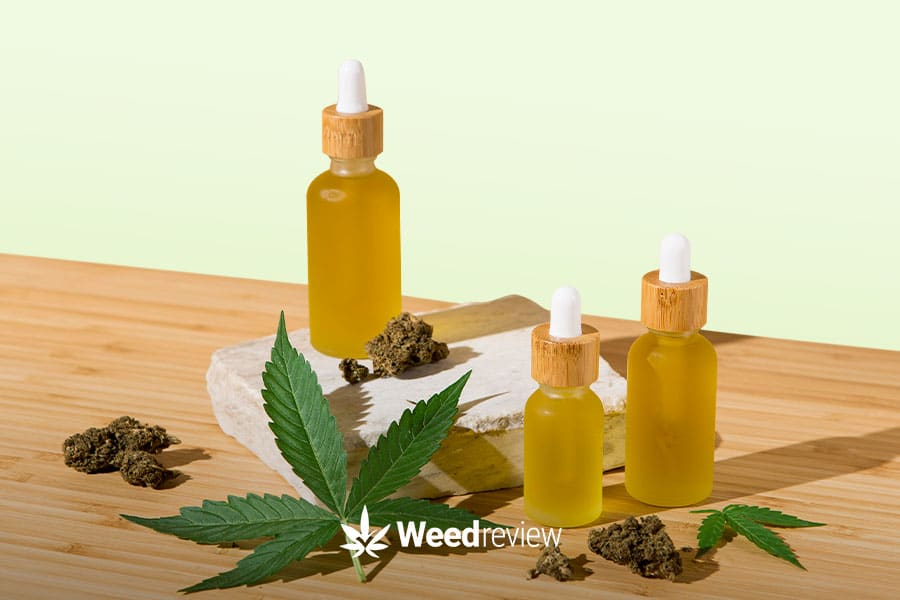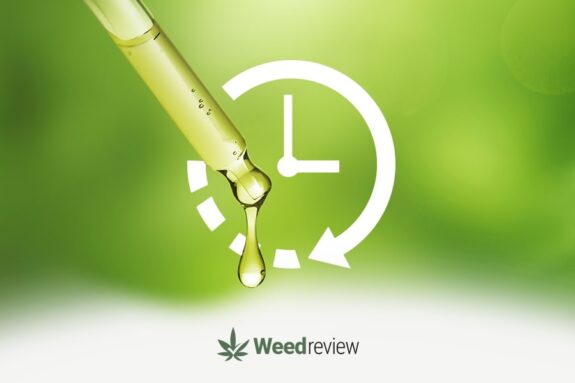
Beginner’s Guide to CBD Oil: Benefits, Usage, and Safety

Table of Contents
CBD oil is gaining attention for its potential to support overall well-being and provide relief from symptoms like chronic pain, forms of epilepsy, and stress problems. While research is ongoing, many people report positive experiences with it.
CBD, short for cannabidiol, is one of the 100+ compounds found in cannabis. Unlike THC, CBD doesn’t cause a ‘high’ feeling or affect your mind like weed does. This means you can enjoy the benefits of marijuana without worrying about its psychoactive effects or getting ”stoned.’ It is also why cannabidiol extracts form an important part of medicinal marijuana – especially in Thailand.
We will dive into the basics of CBD oil, exploring the different types, its medicinal uses, side effects, dosages, and how to use it.
What is CBD oil?
CBD oil is a natural product derived from cannabis, including both hemp and marijuana varieties. While the hemp plant is the primary source for CBD production due to its naturally high CBD content and low THC levels, CBD can also be extracted from cannabis strains with higher THC levels, commonly known as marijuana.
There are three common methods by which cannabidiol is extracted from the cannabis plants:
- CO2 Extraction: This method utilizes carbon dioxide (CO2) in a controlled environment to extract CBD oil. It’s considered a safe and efficient method, as it preserves the purity of the extracted compounds.
- Solvent Extraction: In this method, a solvent, such as ethanol, butane, or isopropyl alcohol, is used to extract CBD oil from the plant material. The solvent dissolves the cannabinoids and other compounds, which are then separated from the solvent.
- Olive Oil/Coconut Oil Extraction: The process includes heating the plant material and the oil together, which allows the cannabinoids to dissolve into the oil. This is the most common method to make CBD oil at home, as other techniques require expertise and specialised equipment.
The end extract is then used as a tincture or CBD spray. Some brands – like Diip and Mellow Organic – also add flavours to remove the earthy taste of cannabis.
Is CBD oil legal?
Yes, CBD oil is legal in Thailand. When medical cannabis was legalised in the country, cannabidiol was at the forefront – owing to its non-intoxicating, safe, and non-addictive nature.
You can visit our page on the legality of cannabis in Thailand for more information.
Where to buy CBD oil
With medical cannabis legal in Thailand, you can buy CBD oil in Thailand online and in dispensaries. The question is of safety and quality.
As a rule of thumb, any CBD-based product you buy should have the following:
- Third-Party lab testing: Choose CBD oil that has undergone third-party testing by independent laboratories. These test results ensure transparency and verify the product’s potency, purity, and safety.
- Ingredient transparency: Opt for CBD oil brands that provide clear and detailed information about their ingredients. Look for products with minimal, high-quality ingredients, and avoid those with artificial additives or unnecessary fillers.
- Organic and pesticide-free: Select CBD oil derived from organically grown hemp. Organic farming practices minimize the use of pesticides, herbicides, and other harmful chemicals, ensuring a cleaner and safer product.
- THC content: Confirm that the CBD oil contains less than 0.2% THC, as this ensures compliance with legal regulations and reduces the risk of psychoactive effects.
- Manufacturing Standards: Look for CBD oil produced in facilities that adhere to Good Manufacturing Practices (GMP). These standards ensure consistent quality control and product safety.
- Customer Reviews and Reputation: Research the brand’s reputation and read customer reviews. Positive feedback and testimonials can provide insights into the quality and effectiveness of CBD oil.
At Weed Review, we have reviewed the leading cannabidiol extracts in Thailand – all legal and compliant with the local norms. Our product testing team has done the research and legwork to present you with the best options to meet your CBD needs.
Spectrums of CBD oil
CBD oil is available in different types, often categorised based on the spectrum of cannabinoids present in the product. The three main types are full-spectrum CBD oil, broad-spectrum CBD oil, and CBD isolate.
Full-spectrum
Full-spectrum CBD oil contains a wide range of cannabinoids, including CBD, as well as trace amounts of THC (less than 0.2%). Alongside CBD and THC, it retains other beneficial chemicals like terpenes, flavonoids, and other cannabinoids like CBG (cannabigerol) and CBC (cannabichromene).
The presence of these additional compounds is believed to create an entourage effect, where the compounds work together synergistically to enhance the health benefits of marijuana.
Full-spectrum CBD oil may result in a positive drug test for THC and may have mild psychoactive effects, although they are generally minimal.
Broad-spectrum
Broad-spectrum CBD is similar to full-spectrum CBD in that it contains multiple cannabinoids, terpenes, and flavonoids. However, it undergoes an additional step to remove any detectable THC, making it a THC-free option.
With broad-spectrum CBD oil, you can potentially experience the entourage effect – without the concern of THC-related intoxication. It can be a suitable choice for those who want to avoid THC or who may be subject to regular drug testing.
Isolate
CBD isolate is the purest form of CBD available. It undergoes a process that removes all other chemical compounds, including cannabinoids, terpenes, and flavonoids, leaving behind only isolated CBD in crystalline powder or solid form.
CBD isolate contains no THC or other cannabinoids, making it an ideal option for individuals who prefer to avoid any traces of such chemicals. While CBD isolate may lack the entourage effect, it still holds potential therapeutic value.
Benefits of CBD oil
There are four conditions in which CBD oil has shown promise to be an effective treatment.
Even in Thailand, universities and hospitals, under the guidance of the Ministry of Public Health and the Department of Thai Traditional & Alternative Medicine, are conducting human studies and clinical trials to explore the use of CBD oil & cannabis extracts as a potential treatment option in Thai medicine.

Pain relief
CBD oil may help alleviate pain by interacting with the endocannabinoid system (ECS) in the body. The ECS plays a role in regulating various bodily functions, including pain perception. Due to its strong anti-inflammatory properties, CBD may reduce inflammation and potentially offer relief from chronic pain, neuropathic pain and cancer-related pain.
Mental health
CBD can interact with receptors in the brain that regulate mood and emotions, promoting a sense of calmness and relaxation. CBD oil has been used by many individuals to manage symptoms of generalized anxiety disorder, social anxiety, and post-traumatic stress disorder (PTSD).
Sleep quality
CBD may help regulate sleep patterns by interacting with receptors in the ECS and influencing sleep-wake cycles. It may assist in falling asleep faster, staying asleep longer, and experiencing more restful sleep, benefiting those with insomnia or sleep disturbances.
Epilepsy symptoms
CBD oil has shown promise in the management of epilepsy symptoms, particularly in certain types of treatment-resistant epilepsy. The effectiveness of CBD in reducing seizures has led to the approval of a CBD-based medication called Epidiolex by the U.S. Food and Drug Administration (FDA) for the treatment of two rare and severe forms of epilepsy: Dravet syndrome and Lennox-Gastaut syndrome.
There are more benefits to CBD oil, which can be found here.
How to use CBD oil
There are three common methods of using CBD oil. If you are using it for medicinal purposes, it is best to speak to your doctor for a proper treatment plan.
Topical use
CBD oil can be applied directly to the skin, providing localised relief in targeted areas. Simply apply a small amount to the desired area and gently massage it into the skin until absorbed. This method is commonly used for addressing muscle soreness, joint discomfort, or skin conditions.
Sublingual use
Sublingual use involves placing CBD oil under the tongue, where it is absorbed into the bloodstream through the tiny blood vessels in the mucous membranes. Use the dropper to place the desired amount of oil under your tongue and hold it there for 60 to 90 seconds before swallowing.
This method allows for efficient absorption, bypassing the digestive system and delivering cannabidiol directly into your system. Sublingual use is popular for those seeking faster onset of effects and precise dosage control.
Adding to food and drinks
CBD oil can also be added to food and beverages, providing an easy way to add it to your daily routine. You can mix it into your favourite recipes, like smoothies, salad dressings, or baked goods. It can also help mask any natural hemp flavour that some may find unappealing. Do avoid high heat to preserve the potency and beneficial effects of CBD.
How CBD oil feels
CBD oil is often described as promoting a sense of relaxation, reduced anxiety, and overall well-being. It may help create a state of calmness without impairing brain function or causing sedation.
Some people may notice a slight change in their mood, feeling more balanced or at ease after using CBD oil. The effects can be influenced by factors such as dosage, individual body chemistry, and the specific product used.
CBD affects everyone differently – it varies from person to person – and some people may not notice any immediate effects. For others, the effects of CBD may be more pronounced, especially when using higher doses or in cases where it addresses specific symptoms such as pain, inflammation, or anxiety.
Dosage requirements
Determining the right dosage of CBD oil depends on factors like body weight, desired effects, and product concentration.
It’s best to start with a low dose and gradually increase it to find the right amount for you.
Consider your body weight and the CBD concentration in the product. Read the product label and follow the manufacturer’s instructions for dosing. Listen to your body’s response and adjust the dosage accordingly.
If needed, consult a doctor at any of the state-approved medical cannabis clinics for specific guidance.
CBD is generally safe, and there have been no reports of lethal overdose. However, it’s always wise to exercise caution, start low, and monitor how your body reacts. For more detailed information on dosage requirements, refer to our detailed take on the topic.
Side effects of CBD oil
CBD oil is generally well-tolerated by most individuals, but like any supplement, it can cause some adverse effects. While these are typically mild and pass with time, it’s important to be aware of them.
- Dry Mouth: CBD may temporarily reduce saliva production, leading to a dry or cotton-mouth sensation. Staying hydrated by drinking water can help alleviate this discomfort.
- Fatigue and Drowsiness: In some cases, CBD oil may cause drowsiness or a feeling of lethargy. It is advisable to avoid driving or operating machinery until you understand how CBD affects you.
- Changes in Appetite: CBD may influence appetite, causing an increase or decrease in hunger. These effects can vary from person to person.
- Diarrhoea: High doses of CBD oil may sometimes lead to digestive issues such as diarrhoea. It’s recommended to start with a low dose and gradually increase as tolerated.
- Topical use: When using CBD oil topically, it’s essential to be cautious of any potential skin allergies or irritations. Perform a patch test on a small area of skin before applying it more extensively.
Drug interactions
CBD has the potential to interact with certain medications, so it’s crucial to exercise caution, especially if you are taking prescription drugs. CBD can affect the liver enzymes responsible for metabolising many medications, potentially leading to altered blood levels of those drugs. If you are currently on medication, consult your doctor to ensure there are no adverse interactions between CBD and your prescribed medications.
Everyone’s body reacts differently to CBD, and while these side effects are possible, not everyone may experience it. If you experience any adverse reactions, discontinue CBD use and speak to your doctor.
Conclusion
CBD oil offers a natural option for promoting relaxation and managing certain symptoms to support overall well-being. But with any health supplement, it is important to prioritise safety, quality, and responsible usage.
When considering CBD oil, look for reputable brands that provide transparent information about their products, undergo third-party testing, and adhere to high manufacturing standards. Additionally, speak to a doctor for personalised advice and to ensure CBD is suitable for your individual needs. With careful consideration and informed choices, CBD oil can be a valuable addition to a wellness routine.


